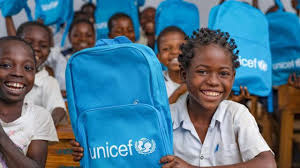By Muhammad Amaan
United Nations Children’s Fund (UNICEF) said massive investments in basic education for African children are required to help the continent realise its long-term transformation agenda.
Etleza Kadili, UNICEF regional director for Eastern and Southern Africa, said in a statement issued in Nairobi, the Kenyan capital ahead of the Day of the African Child that will be marked Sunday.
It said education financing on the continent remains dismal.
It added that less than one in five countries have dedicated 20 per cent of their public budgets to enhancing foundational skills for their children.
“To ensure prosperity in Africa we urgently need to see a continental revolution where commitments are turned into concrete action so children can attain the foundational skills necessary for them to progress to higher forms of education.”
The theme of the 2024 Day of the African Child, which is observed annually on June 16, will be “Education for all children in Africa: the time is now,” underscoring the urgency to realise universal childhood literacy in the continent.
UNICEF said in spite of its role in building human capital to propel Africa’s growth, education financing in the continent has slackened, preventing millions of children from acquiring the basic literacy and skills that they require to thrive.
In spite of significant efforts by African governments over the last decade to boost primary and secondary school enrolment, schools continue to lack basic amenities, are overcrowded, and have insufficient teachers, according to UNICEF.
The UN agency noted that four out of every five African children aged 10 years are unable to read and understand a simple written text, highlighting the dismal learning outcomes on the continent.
UNICEF estimates that about $183 billion are required annually to support children’s education in Africa and achieve the Sustainable Development Goal on education.
However, available resources currently stand at $106 billion, leaving a financing gap of over 40 per cent.
The agency further noted that African governments spend around two per cent of their education budgets on pre-primary education, while 20 per cent is allocated to tertiary learning.




